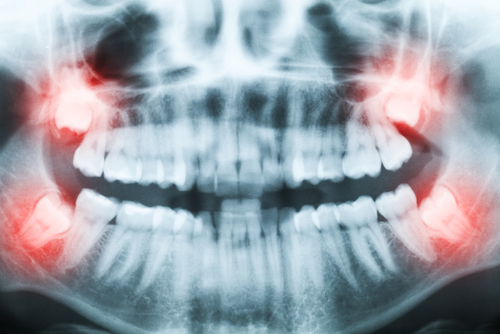Have you ever been the last person who tried to squeeze into a crowded elevator? Not only were you likely uncomfortable, but putting too many people into too small a space makes everyone uncomfortable. That feeling of being crammed into a space that’s not big enough is what your 28 other teeth may feel when your wisdom teeth start coming in. Not every person will experience issues with their wisdom teeth; sometimes, they grow in properly and never cause an issue. Unfortunately, when wisdom teeth do cause problems, the symptoms are usually more serious than feeling cramped in an elevator. When wisdom teeth are causing oral health issues, or if we can see that they will cause those problems in the future, it’s time for a wisdom tooth extraction.
Why Do We Have Wisdom Teeth?
 Wisdom teeth, also known as the third molars, start to come in toward the end of adolescence and into young adulthood, around age 17 to 26. They’re named for the supposed “wisdom” we’re supposed to have earned during those years.
Wisdom teeth, also known as the third molars, start to come in toward the end of adolescence and into young adulthood, around age 17 to 26. They’re named for the supposed “wisdom” we’re supposed to have earned during those years.
Our ancient ancestors needed these extra wisdom teeth to survive, as their diets consisted of much more raw meat, plants, and nuts that needed to be ground up.
However, these extra molars have become less necessary today thanks to our changing diet, smaller jaws than our caveman ancestors, and modern cooking techniques. It varies depending on ancestry and geographical location, but nowadays, anywhere from 5% to 37% of the world’s population never had their wisdom teeth develop at all.
When Is a Wisdom Tooth Extraction Necessary?
When there’s not enough room in your mouth for your wisdom teeth to grow properly, they can become impacted. This means they can’t fully break through the gumline and require a tooth extraction to prevent oral health issues.
Various complications may necessitate wisdom tooth extraction, including:
- Painful damage: If your wisdom teeth grow at an angle due to lack of space, they may push against your back molar. This pressure can cause damage to the tooth and increase the risk of infection. This pain, which can last for years if not treated, can also make it difficult to eat and speak.
- Severe decay: Wisdom teeth that are partially impacted, meaning they didn’t completely break through the gum line, can be harder to clean. This partial eruption also makes it much easier for food or bacteria to become trapped in the spaces between the teeth. Some of the symptoms you may notice are pain, redness, swelling, and bad breath.
- Progressive gum disease: The bacteria that builds up in the back of your mouth can also develop into gum disease. When we catch gum disease early, treatment is simple. However, advanced gum disease is a leading cause of tooth loss.
- Shifting teeth: Overcrowding can cause your teeth to shift, leading to crooked teeth and a misaligned bite.
The Wisdom Tooth Extraction Process
The type of extraction performed will depend on how accessible the target tooth is. Since wisdom teeth are located far back in the mouth and can be impacted, they may require a surgical extraction. If you’re anxious about having a tooth extracted, rest assured that Dr. Ney’s 25 years of experience and modern dental technology make it a much more patient-friendly process than in the past. For example, Dr. Ney will always use a bone graft and sutures after the extraction to prevent a dry socket and any chance of infection.
If the wisdom tooth is easily accessible, we can perform a simple extraction. This process involves numbing the tooth with local anesthesia, then loosening and removing it with special dental tools. If the tooth is inaccessible or impacted, it requires a surgical extraction. This procedure can involve incisions, raising gum tissue, and possibly sectioning the tooth for easier removal. Despite its complexity, surgical extraction is a common procedure in the United States.
Post-Extraction Care and Recovery
Caring for your mouth post-extraction is vital. Dr. Ney’s instructions for the first few days typically include the following:
- Get plenty of rest and limit physical activity.
- Avoid brushing or flossing near the extraction site for at least 12 hours.
- Take pain management and antibiotics as prescribed.
- Maintain a soft diet and avoid using straws to prevent disturbing sutures or blood clots.
Patients can generally return to their daily activities in 2-3 days, and following these guidelines is crucial for a smooth recovery.
We Offer Expert Care for Wisdom Teeth Extractions
Tooth extractions, including wisdom teeth removal, are routine yet critical procedures for oral health. Dr. Ney’s experienced hand ensures safe, effective, and comfortable tooth removal. If you’re experiencing issues with your wisdom teeth or want to prevent future problems before they arise, contact us to arrange a free consultation and embark on a journey to better long-term oral health.
